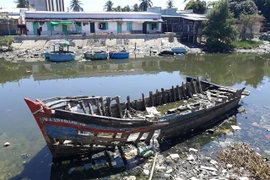Minister of Natural Resources and Environment Tran Hong Ha said buildingpolicies and legislation for plastic waste was the ministry’s key task toimplement the Government’s decision on launching the national action plan formarine plastic waste management.
Under the national action plan for marine plastic waste management, theministry’s agencies, units, civil servants, officials and employees willparticipate in recycling, treating and curbing plastic waste use.
Based on these activities, the ministry will work to change public awarenessabout the impact of environmental pollution by using disposable plasticproducts and non-biodegradable plastic bags in production activities and dailylife.
It will call upon the public to give up the habit of using disposable plasticproducts and replace plastic bags with environmentally friendly products.
The plan focuses on four targets, including completing policies and legislationon plastic waste management; formulating, implementing and reviewingstrategies, projects and some specific tasks; strengthening internationalco-operation on scientific research, technology application in plastic wastetreatment; and raising awareness and changing behaviour towards plastic use.
In terms of building policies and legislation of plastic waste, the VietnamEnvironment Administration will be in charge of reviewing and proposingmeasures to complete regulations on managing re-exported plastic waste orreturning imported plastic scrap that does not meet the requirements ofenvironmental protection.
It will work with authorities to develop new environmental criteria forproducts and plastic bags derived from recycled plastic, products containingmicro-plastic particles and nano-resin to prevent negative impacts on humanhealth and the ecological environment.
It will also propose regulations and roadmaps to ban the use of microplasticsin the production of cosmetics, garments, and fertilisers.
The ministry will require the administration to chalk out policies to limitsingle-use plastic production and consumption and to encourage organisationsand individuals to classify plastic waste for waste collection and recycling.
The use of plastic products such as single-use plastic bottles, cups and strawsin offices or at conferences will be restricted. Waste classification will beimplemented at offices.
The administration will be in charge of publishing documents guiding theclassification of daily-life solid waste at homes and offices.
In addition, the administration needs to take measures to replace disposableplastic bags with eco-friendly ones at shopping malls and supermarkets by 2026.
The administration will work with ministries and agencies to statistic andclassify plastic waste to build a database on registration, declaration, andmanagement of solid waste./.





























